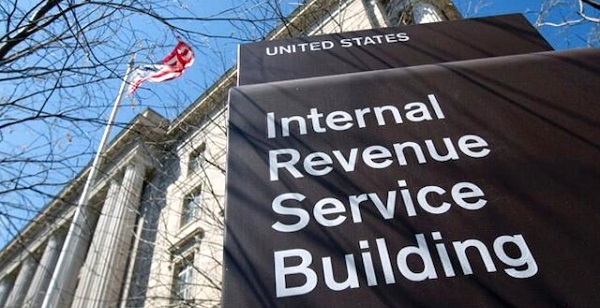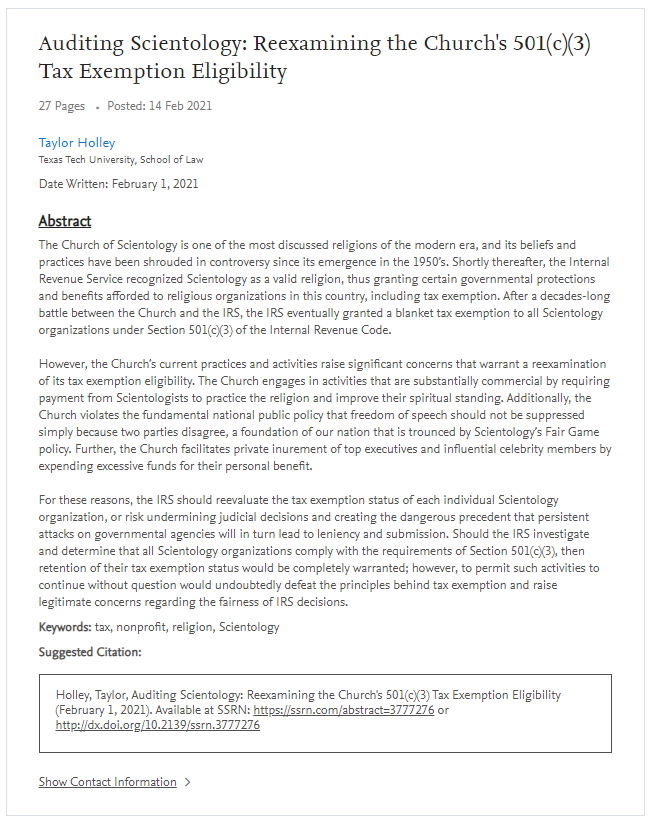This was originally posted under the title: Auditing Scientology: Reexamining Tax Exemption Eligibility which was the title of the article written by Taylor Holley.
I believe the ongoing public policy violations alone should be the immediate end of scientology’s tax exempt status. Taylor points out how “Public Policy” has been narrowly interpreted to mean discrimination, but this is not what the intent of this regulation is. Spending tax exempt money to spy on people, smear and destroy them is NOT in keeping with “public policy.” Scientology violates this every single day. The IRS sits on their hands simply because there has not yet been enough pressure brought to bear on them to act.
One of our commenters (ISNOINews) forward me a link to a wonderful piece by Taylor Holley, a Juris Doctorate candidate at Texas Tech University Law School written for the Law Review.
It is titled Auditing Scientology: Reexamining the Church’s 501(c)3 Tax Exemption Eligibility.
If you click on the link above, you can download the full paper — it is 27 pages long and summarizes all the facts and legal arguments as to why scientology should NOT enjoy tax exempt status.
Below I include her abstract summarizing the paper:
Abstract
The Church of Scientology is one of the most discussed religions of the modern era, and its beliefs and practices have been shrouded in controversy since its emergence in the 1950’s. Shortly thereafter, the Internal Revenue Service recognized Scientology as a valid religion, thus granting certain governmental protections and benefits afforded to religious organizations in this country, including tax exemption. After a decades-long battle between the Church and the IRS, the IRS eventually granted a blanket tax exemption to all Scientology organizations under Section 501(c)(3) of the Internal Revenue Code.
However, the Church’s current practices and activities raise significant concerns that warrant a reexamination of its tax exemption eligibility. The Church engages in activities that are substantially commercial by requiring payment from Scientologists to practice the religion and improve their spiritual standing. Additionally, the Church violates the fundamental national public policy that freedom of speech should not be suppressed simply because two parties disagree, a foundation of our nation that is trounced by Scientology’s Fair Game policy. Further, the Church facilitates private inurement of top executives and influential celebrity members by expending excessive funds for their personal benefit.
For these reasons, the IRS should reevaluate the tax exemption status of each individual Scientology organization, or risk undermining judicial decisions and creating the dangerous precedent that persistent attacks on governmental agencies will in turn lead to leniency and submission. Should the IRS investigate and determine that all Scientology organizations comply with the requirements of Section 501(c)(3), then retention of their tax exemption status would be completely warranted; however, to permit such activities to continue without question would undoubtedly defeat the principles behind tax exemption and raise legitimate concerns regarding the fairness of IRS decisions.
This is a terrific resource. Use it to brief elected officials. Send it to the IRS. To the media.
It lays out the arguments, with supporting citations to facts and law.







Mike, if you check the citations, she cited this very blog several times.
Must be proud for you to know an actual academic paper for a law school’s newspaper is citing your work here.
I read Taylor Holley’s entire writing. She deserves some major props for putting that together. It’s definitely a great piece of information that needs to be spread far and wide. In Scientology fashion maybe it should be published in the NY Times.
You can go to any Scientologists social media account and see who they follow. A lot of conservative politicians, groups and hateful organizations. One of the people I am most aware of is a big supporter of MothersForLiberty. So the anti-trans, anti-CRT, anti-books or basic education of historical fact groups. This person is also apart of the IAS and a proud fundraiser. There is no way Scientology is not telling people how to vote inside the church. No way.
That .pdf just fries Scientology, Hubbard, Miscavige, and even Tom Cruse in paragraph after paragraph.
It’s obvious the tax exempt status should be removed.
PS: wouldn’t it be hilarious if the undoing of Scientology came about because of gifts TO Tom Cruise?
There is absolutely NO doubt that the cult has gotten its tax exempt status criminally and continues to justify not paying taxes as every other ‘for profit’ entity does by representing itself as a ‘religion’. That said, has it been determined that the government is not colluding with the cult? I don’t know how that would be determined but it’s not beyond belief seeing that IRS employees originally granted them tax exempt status when the cult threatened to blackmail several IRS of them.
I try not to be a conspiracy nut…but…the cult is shrewd and ruthless and if there are people in government whose personal lives are still being threatened (or even being paid off by the cult), the action to revoke its tax exempt status may hit a brick wall.
Another reason it should be revoked in the decision by SCOTUS in Hernandez v. Commissioner, 490 U.S. 680 (1989), where it was deemed $cientology was a quid pro quo bueiness has never been overturned. The IRS granted the exeption in spite of this ruling just to make all the lawsuits $cientology was backing go away.
There is also a major flaw in the exemption granted. Unlike every other 501(c)3 exempt organization, $cientology is allowed to set “fixed donation levels”, actually prices, for services. All other 501(c)3 organizations can request donations of a certain amount, but have to take what they are given and cannot refuse services if there is no donation. If they want to set a fixed price for a service or event, it has to be done there a nonexempt “affiliated entity”, e.g., a book store, which then, unlike $cientology, has to pay taxes on the amount received. Failure to do this can result in revocation of the tax exemption.
Wow. Perfect. Just perfect, Mike.
Maybe all quid pro quo businesses in the US should state they are churches and apply for tax exempt status citing 490 US 680 (1989) and the IRS’s ignoring of the law as justification. Alternatively sue the IRS for treating them differently or force the IRS to abide by the law. Put pressure on the IRS to highlight their discriminatory acts against other businesses and to justify their position. Maybe 2000 or 3000 law suits raise by businesses against the IRS might make them think again.
Geoff, I’m just waiting for a struggling gaming company to claim they have a cult following, that many followers live lives devoted to the “subject,” and file for religious non-profit status.
Major names could follow:
16 Brands That Have Fanatical Cult Followings
https://www.businessinsider.com/cult-brands-2012-6
I wonder if any lawyers see a way to represent someone with standing to bring a suit that brings up this Supreme Court case again, in a client’s favor?
I wonder if any of the ex Scientology big time lawyers when viewing things, would have opinions that could favor such a future client?
Crowd sourcing some high priced ex Scientology lawyers who could win any cases against Scientology, I’d donate for that.
The problem I see in the IRS letter is that Scientology requires parishioners to make payments to practice their religion. The IRS could argue that so does Mormonism in requiring its members to be full tithe payers in order to go to the temple and participate in those rites. Rather, say that Scientology requires set fees to practice the religion and that members cannot achieve any of the spiritual gains offered by Scientology unless those fees were paid. This would then set Scientology apart from other religions.